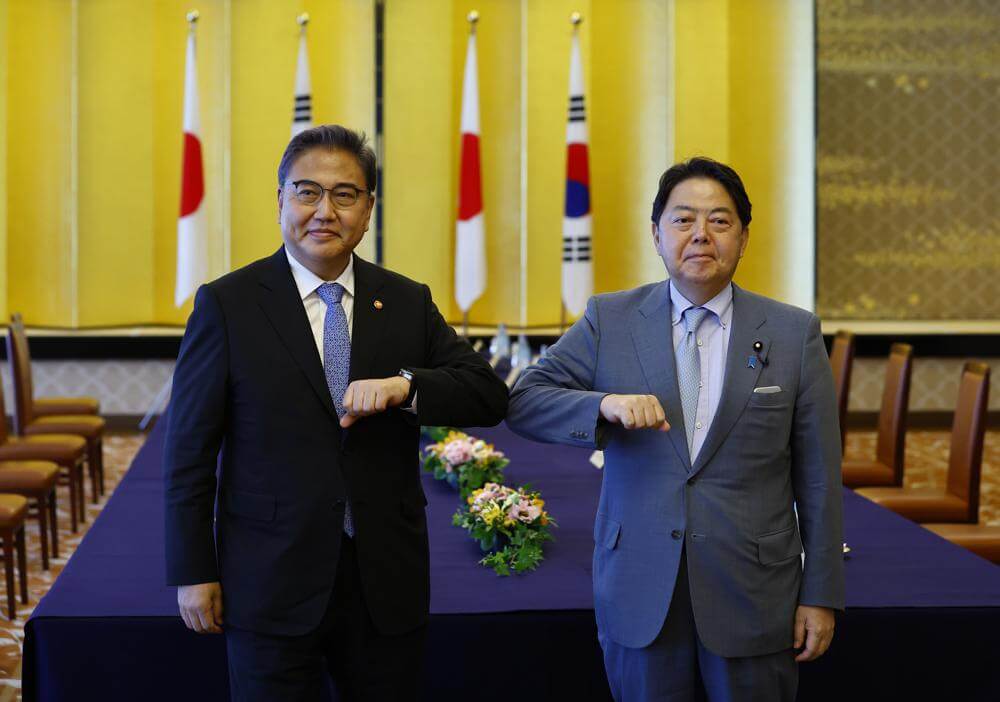Japan and South Korea’s foreign ministers (FMs), Yoshimasa Hayashi and Park Jin, agreed to an “early resolution” of the two countries’ longstanding bilateral disputes, including compensation for Korean victims of wartime forced labour, through “expedited consultations.”
“It is necessary to develop Japan-South Korea relations based on the foundation of friendship and cooperation the two countries have built since the normalisation of our diplomatic relations in 1965,” Hayashi told Park.
South Korean foreign minister to visit Japan on Monday 🧵
— Korea Pro (@southkoreapro) July 18, 2022
(1) Park Jin will visit Tokyo for three days and meet with his Japanese counterpart and possibly even Prime Minister Fumio Kishida. Park is also expected to offer condolences to former Japanese Prime Minister Shinzo Abe.
Following the meeting, Hayashi said during his regular press conference on Tuesday that both ministers agreed that bilateral cooperation, as well as their trilateral cooperation with the US, is “ever more important” in the face of North Korea’s expanding nuclear program. They also jointly condemned Russia’s aggression against Ukraine.
Prior to his departure, Park told reporters that both sides hoped to engage in “comprehensive discussions” on various issues, including an intelligence-sharing pact, called the General Security of Military Information Agreement (GSOMIA), which the previous Moon Jae-in government “conditionally” suspended in protest of Tokyo’s unilateral export restrictions.
In recent times, the relationship between the two has been challenged by several diplomatic tiffs. Last year, South Korea’s Defence Ministry published a white paper that downgraded Japan’s status from “partner” to “neighbour.” According to South Korea, this change in wording was considered “reasonable” because Japan had removed South Korea from its list of preferential export nations in 2019. The document also blamed Japan for “stalemating ties” with South Korea by making “unilateral announcements that misrepresented facts”. This is a reference to Japan’s disputed claim to the South Korea-controlled Dokdo Islands (called Takeshima Islands by Japan) in the Sea of Japan and a military encounter between a Japanese surveillance plane and a South Korean vessel in December 2018, when Japan accused South Korea of violating the Code for Unplanned Encounters at Sea by aiming the vessel’s fire-control radar at a plane.
Furthermore, in 2018, South Korea’s Supreme Court ordered Japanese companies Mitsubishi and Nippon to “compensate South Koreans forced to work in its factories” during Japanese colonial rule. Following this, last August, a South Korean court began proceedings to liquidate assets seized from Japan’s Nippon Steel Corp, which had refused to comply with a Supreme Court decision to award $8,400 each to four former World War II workers. In fact, South Korean victims of wartime labour conscription sued the Japanese companies in the 1990s. However, Japanese courts ruled in favour of the companies, leading the victims to take their cases to South Korean courts instead.
South Korea Foreign Minister Park Jin on a visit to Tokyo. The new government in Seoul wants to downplay the Comfort Women and forced labor issues, but it is unclear how far they can go to satisfy the Japanese right before they antagonize the South Korean public back home. (MP)
— SNA Japan (@ShingetsuNews) July 19, 2022
Hayashi added during his press conference that the liquidation of assets would cause “a serious situation” to Japan-South Korea relations and “must be avoided.” “We have agreed to reach an early resolution to this issue going forward,” he told reporters. The resolution of the dispute has gained urgency, as South Korea’s Supreme Court is expected to release its final verdicts on whether to allow the liquidation of assets as early as August.
A pair of statues in Pyeongchang depicting a man kneeling before “comfort women” further complicated diplomatic relations between Seoul and Tokyo last year, as Japan questioned if “the male figure represents the Japanese Prime Minister”.
Prior to this, in 2015, the two countries sought to settle the dispute over sexual slavery, announcing a “final and irreversible” agreement. As part of the deal, then-PM Shinzo Abe issued an apology and released $8 million for a compensation fund. However, many South Koreans did not accept the agreement and the victims even refused the money in protest. Incumbent South Korean President Moon Jae-in shut down the fund in 2018, reigniting tensions once more.
FM Hayashi and his South Korean counterpart Park Jin concurred in Tokyo on July 18 that it’s now more important than ever to develop Japan-South Korea relations and Japan - the U.S.- South Korea trilateral relations in light of the increasingly severe strategic environment. https://t.co/nyuEMkPOTK
— MIZOBUCHI Masashi (@JapanEmbDC_SPX) July 19, 2022
In this regard, Park told reporters last week that “While looking at (history) squarely, we want to establish future-oriented cooperative relations with Japan that meet our shared interest and values.” Moreover, Seoul’s Foreign Ministry also launched consultations in July with lawyers, experts, and activists representing the Korean forced labourers in order to find solutions to the dispute. However, it remains unclear if the efforts will culminate in a breakthrough.
The meeting, which was held in Tokyo, was Park’s first official visit to Japan since being appointed to the position in May. Reflective of new President Yoon Suk-yeol’s renewed efforts to mend ties with Tokyo, the visit marks the first time that Seoul’s top diplomat has travelled to Japan in more than four years in order to have one-on-one talks with their counterpart. In December 2017, then FM Kang Kyung-wha visited Tokyo to participate in such a bilateral session.
During the three-day visit, which began on Monday, Park is also expected to meet with Japanese Prime Minister (PM) Fumio Kishida today. The visit is significant for regional security, as the Joe Biden administration has been trying to bridge the gap between the two countries in order to bolster defences against an aggressive China and an unstable North Korea.

